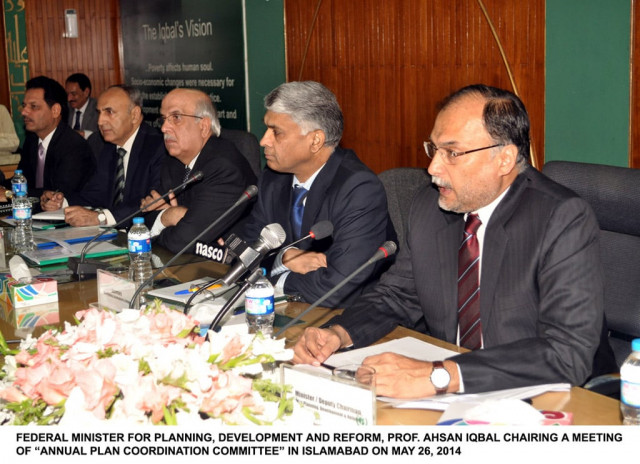APCC recommends 5.1% growth target
Clears economic framework, notes that outlook points to significant recovery.

Minister for Planning, Development and Reforms Ahsan Iqbal chairing a meeting of Annual Plan Coordination
Committee in Islamabad on May 26, 2014. PHOTO: PID
The Annual Plan Coordination Committee has recommended setting next year’s economic growth target at 5.1% and of inflation at 8% but cautioned that energy shortages, security situation and additional taxes may pose downside risks to the growth target.
The APCC also recommended setting the investment target at 15.7% of Gross Domestic Product (GDP) against this year’s 14%. The per capita Gross National Product (GNP) is projected at Rs160,443 for the fiscal year 2014-15, commencing from July.
Headed by Minister for Planning, Development and Reforms Ahsan Iqbal, the APCC on Monday cleared the economic framework for the approval of the National Economic Council (NEC). Prime Minister Nawaz Sharif will chair the NEC on May 29 to approve the framework.

“The growth targets are subject to risks like deterioration in energy availability, extreme weather fluctuations, non-implementation of envisaged reforms and fiscal profligacy,” noted the APCC. The APCC working paper, prepared by the Planning Commission, carries some quality advice for the Ministry of Finance to bring real improvement in the economic conditions.
It notes that the outlook for 2014-15 portends a significant recovery in growth momentum and trajectory amid wide ranging challenges including persistent energy shortages, supply-side constraints, inefficiencies of production, further reduction in fiscal deficit by mobilizing additional revenues and demand for structural reforms besides security challenges.
“Without bringing improvement in tax collection, investment and increasing exports, the country’s national development agenda remains incomplete,” said Iqbal after the APCC meeting.
The 5.1% growth rate is projected to be achieved with the aid of healthy growth in industry and services sector but a risk remains that growth in the agriculture sector will remain weak in the next fiscal year as well.
The agriculture sector is projected to grow by 3.3%, industry 6.8% and services 5.2%. The large scale manufacturing is projected to grow to 7% next year.
Regaining macroeconomic stability and adequate investment are critical for improved growth prospects, the APCC working paper observed.
The constraining factors such as lack of structural reforms, high fiscal deficit and accommodative monetary policies are no more desirable as they have serious consequences for inflation, balance of payments and foreign exchange reserves, the paper noted.
The government has also pinned down the reasons for below the expectations growth in the outgoing fiscal year.
The growth rate of 4.4% for the outgoing fiscal year was consistent with assumption of slight improvements in energy supplies, normal weather conditions, fiscal adjustments and better investment prospects. Some of these targets could not be achieved, resulting in the subsequent missing of the annual growth target.
“Fiscal situation for 2013-14 faced certain downside risks like shortfall in FBR tax collection and a sharp rise in federal current expenditures on account of more than budgeted expenditures on power subsidies and persistent increase in interest payments”.
It noted that in the outgoing fiscal year, the financing of the modest current account deficit remained challenging and the trade imbalance remained a cause of concern for a sustainable balance of payments.
For the upcoming fiscal, exports are projected to grow by 5.8% to $27 billion from $25.5 billion of this year. Imports during the next year are projected to grow by 6.2% to $44.2 billion, up from $41.6 billion of this year. The trade deficit is projected at $17.2 billion.
The current account deficit is projected at $2.8 billion or 1.1% of the GDP as against deficit of $2.6 billion or 1% of the GDP of this fiscal. The net capital inflows for the next fiscal year are estimated at $5.6 billion as against $4.9 billion of this year. The main challenges for the next fiscal year remain external debt repayments including to the IMF, uncertainty surrounding international oil prices and weak non-debt creating inflows, according to the APCC.
In the presence of these challenges, the foreign exchange reserves build-up will be critical for providing the much-needed confidence to the economy, it advised.
Published in The Express Tribune, May 27th, 2014.
Like Business on Facebook, follow @TribuneBiz on Twitter to stay informed and join in the conversation.


















COMMENTS
Comments are moderated and generally will be posted if they are on-topic and not abusive.
For more information, please see our Comments FAQ